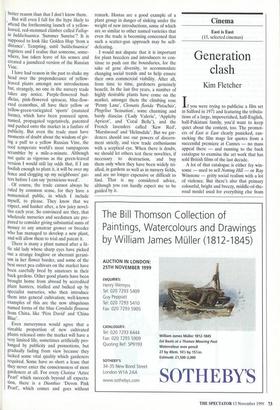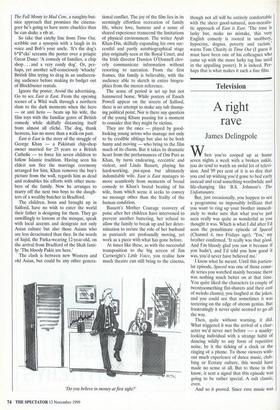Cinema
East is East (15, selected cinemas)
Generation clash
Kim Fletcher
If you were trying to publicise is film set in Salford in 1971 and featuring the tribula- tions of a large, impoverished, half-English, half-Pakistani family, you'd want to keep quiet about the content, too. The promot- ers of East is East clearly panicked, ran- sacking the film mags for quotes from a successful premiere at Cannes β no mass appeal there β and running to the back catalogue to examine the art work that has sold British films of the last decade.
A lot of that catalogue is either fey win- some β used to sell Notting Hill β or Ray Winstone β gritty social realism with a lot of violence. But there's also that primary colourful, bright and breezy, middle-of-the- road model used for everything else from The Full Monty to Mad Cow, a naughty-but- nice approach that promises the cinema- goer he's going to have more chuckles than he can shake a rib at.
So take that catchy line from Time Out, scribble out a synopsis with a laugh in its voice and Bob's your uncle. 'It's the dog's b*11*cics' screams the poster over a priapic Great Dane: 'A comedy of families, a chip shop ... and a very randy dog'. Or, per- haps, yet another self-consciously 'whacky' British film trying to drag in an undiscem- ing audience before making its budget out of Blockbuster rentals.
Ignore the poster. Avoid the advertising. Go to see East is East. From the opening scenes of a Whit walk through a northern slum to the dark moments when the hero β or anti hero β beats up his wife, the film toys with the familiar genre of British comedy while skilfully distancing itself from almost all clichΓ©. The dog, thank heavens, has no more than a walk-on part.
East is East is the story of the struggle of George Khan β a Pakistani chip-shop owner married for 25 years to a British Catholic β to force his seven children to follow Islamic tradition. Having seen his eldest son flee the marriage ceremony arranged for him, Khan removes the boy's picture from the wall, regards him as dead and redoubles his efforts with other mem- bers of the family. Now he arranges to marry off the next two boys to the daugh- ters of a wealthy butcher in Bradford.
The children, born and brought up in Salford, have no wish to enter the world their father is designing for them. They go unwillingly to lessons at the mosque, speak with local accents and denigrate not only Asian culture but also those Asians who are less deracinated than they. In the words of Sajid, the Parka-wearing 12-year-old, on the arrival from Bradford of the Shah fami- ly: The bloody Pakis are here.'
The clash is between new Western and old Asian, but could be any other genera-
tional conflict. The joy of the film lies in its seemingly effortless recreation of family life, where love, humour and a sense of shared experience transcend the limitations of physical environment. The writer Ayub Khan-Din, skilfully expanding his own suc- cessful and partly autobiographical stage play originally seen at the Royal Court, and the Irish director Damien O'Donnell clev- erly communicate information without resorting to narration. From the first frames, this family is believable, with the audience able to sketch in entire biogra- phies from the merest reference.
The sense of period is set up but not hammered home. While posters of Enoch Powell appear on the streets of Salford, there is no attempt to make any tub thump- ing political point. Nor is there any question of the young Khans pausing for a moment to consider that they might be victims.
They are the ones β played by good- looking young actors who manage not only to be credible siblings but also to be both funny and moving β who bring to the film much of its charm. But it takes its dramatic heart from the performances of Om Puri as Khan, by turns endearing, eccentric and violent, and Linda Bassett, playing his hard-working, put-upon but ultimately indomitable wife. East is East manages to move seamlessly from moments of broad comedy to Khan's brutal beating of his wife, from which scene it seeks to convey no message other than the frailty of the human condition.
Bassett's Mother Courage recovery of poise after her children have intervened to prevent another battering, her refusal to allow the family to break up and her deter- mination to secure the role of her husband as patriarch are profoundly moving, yet work as a piece with what has gone before.
At times like these, as with the successful transposition to the big screen of Jim Cartwright's Little Voice, you realise how much theatre can still bring to the cinema,
Do you believe in money at first sight?'
though not all will be entirely comfortable with the sheer good-natured, non-moralis- tic approach of East is East. 'The tone is larky but, make no mistake, this very English comedy is rooted in snobbery, hypocrisy, dogma, poverty and racism,' warns Tom Charity in Time Out (I guess it must have been one of his colleagues who came up with the more larky tag line used in the appalling poster). It is indeed. Per- haps that is what makes it such a fine film.



























































































 Previous page
Previous page